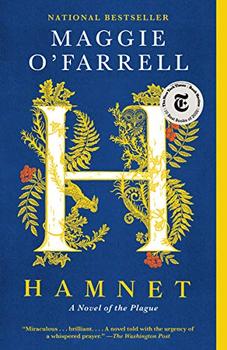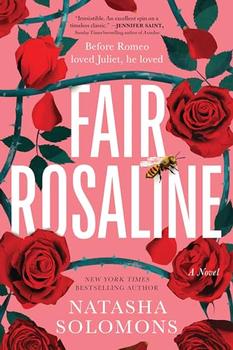Summary | Excerpt | Reading Guide | Discuss | Reviews | Beyond the book | Read-Alikes | Genres & Themes | Author Bio

William Shakespeare's name is never used in Hamnet — a conspicuous absence around which Maggie O'Farrell forms her richly imaginative narrative. Instead, the novel tells the story of those closest to Shakespeare: his parents, John and Mary; his wife Agnes; his daughter Susanna; and his twin children Hamnet and Judith. Shakespeare himself features in the narrative, though he is only ever described in relation to those around him, referred to as the Latin tutor, the husband, the father, the son. The result of this narrative decision is twofold: it pushes Shakespeare's family to the foreground, but it also humanizes Shakespeare himself by reminding the reader that none of his works were created in a vacuum. This is the central conceit around which the novel's climax is formed, as O'Farrell imagines the potential influence of Hamnet's death in 1596 on Hamlet, written between 1599 and 1601.
Despite the novel's title, Agnes is its protagonist. O'Farrell draws on the limited historical detail that we have about the real Agnes as her backdrop, and then fleshes her out into a compelling character. Portrayed as a village outcast, there are whispers and rumors throughout the book that she's a witch; this is heightened by a hint of magical realism in which Agnes is able to divine certain details about the future. She knows, for example, that she will have two children standing at her bedside when she dies; she is shocked then when she gives birth to twins, already having one older child (the reader, of course, understands that her vision is accurate, knowing that Hamnet will die young).
The first two-thirds of the novel are split into a dual timeline, bouncing back and forth between the week of Hamnet's death (the present), and the blossoming romance between William and Agnes (the past). It's a tender yet fraught courtship, and the pacing here is slow and deliberate. The final third speeds up and takes place after the death of their son. Both parts are equally as successful — the languid pace is sustained by O'Farrell's lyrical prose, and the more frantic pace is made tense and urgent by it.
Every life has its kernel, its hub, its epicenter, from which everything flows out, to which everything returns. This moment is the absent mother's: the boy, the empty house, the deserted yard, the unheard cry. Him standing here, at the back of the house, calling for the people who had fed him, swaddled him, rocked him to sleep, held his hand as he took his first steps, taught him to use a spoon, to blow on broth before he ate it, to take care crossing the street, to let sleeping dogs lie, to swill out a cup before drinking, to stay away from deep water. It will lie at her very core, for the rest of her life.
This novel is gentle and domestic and, in many ways, speaks to grief as a commonality of the human experience. But despite O'Farrell's light touch with historical detail, it's a novel that cannot be removed from its Shakespearean context. The allusions to Shakespeare's works are more hints and whispers than overt references, but any eagle-eyed Shakespeare fan will enjoy the way O'Farrell plays with expectations, ducking around moments that could be turned into fan service by an author with a heavier hand. And what if I fail? Shakespeare asks Agnes at one point, echoing Macbeth's line If we should fail? Agnes's response is not, however, Lady Macbeth's famous retort (We fail!) — instead she says You won't fail. I know it.
The point is clear — Shakespeare's plays were all works of fiction; Agnes likely never said the words We fail!/ But screw your courage to the sticking-place, and we'll not fail to her husband, thus inspiring Lady Macbeth's famous line. But as reality and fiction often exist in a symbiotic relationship, O'Farrell imagines the subtler influences of Agnes and Hamnet on Shakespeare in a novel that's as intimate and human as it is grandiose.
![]() This review was originally published in The BookBrowse Review in August 2020, and has been updated for the
June 2021 edition.
Click here to go to this issue.
This review was originally published in The BookBrowse Review in August 2020, and has been updated for the
June 2021 edition.
Click here to go to this issue.

If you liked Hamnet, try these:

by T. Kingfisher
Published 2024
From USA Today bestselling author T. Kingfisher, Thornhedge is the tale of a kind-hearted, toad-shaped heroine, a gentle knight, and a mission gone completely sideways.

by Natasha Solomons
Published 2024
The most exciting historical retelling of 2023: a subversive, powerful untelling of Romeo and Juliet by New York Times bestselling author Natasha Solomons.
Was the greatest ever love story a lie?
Your guide toexceptional books
BookBrowse seeks out and recommends the best in contemporary fiction and nonfiction—books that not only engage and entertain but also deepen our understanding of ourselves and the world around us.